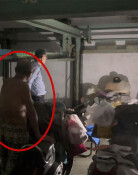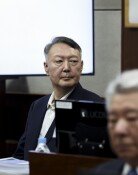Wartime Command Worrying Say Officers
Wartime Command Worrying Say Officers
Posted August. 10, 2006 05:29,
President Roh Moo-hyuns comment that, Even if wartime operational control is redeemed now, we are able to exercise wartime command, has his first reserve generals and officers who served in the Korea-U.S. Combined Forces Command (CFC) remarking that he is neglecting Koreas current state.
Most first reserve officers Dong-A Ilbo got in touch with were concerned that if the CFC is disorganized due to the redemption of wartime command, it will be a great loss of strategy and tactics to Korea.
One first reserve general said, The higher an officer becomes, the more he realizes the power of the U.S. army through CFC training, and understands the importance of the combined forces system of command. It is too early to discuss the redemption of wartime command in the present situation.
Considerable criticisms brought against the Ministry of National Defenses claims that if precision weapons such as multipurpose application satellites and the Airborne Early Warning and Control (AEWAC) platforms are secured, deterrence against North Korea will be prepared.
An officer recently discharged from the CFC said, Most Korean officers who have done combined training comprehend that not only information and military strength, but also warfare ability in all areas, such the fact that communications and transportation during military operations must be guaranteed. The thought that a few high-tech weapons will make a self-reliant national defense is strategically and tactically an illusion.
These officers are worried that without the CFC, even establishing a plan may be impossible for the Korean Army.
A first reserve colonel who hails from the CFC said, The CFCs core task is to establish military maneuvers, and this is possible because the CFC can make use of the U.S. army force in moments of need. If the CFC is disorganized, U.S. support will become passive, and establishing a plan alone will become hard for the Korean army.
The Korean army has been learning to establish plans during combined training, but this is still at an amateur level.
Another officer pointed out, If Korea isnt able to establish independent battle maneuvers, and relies on the U.S. army after the redemption of wartime command, it will create confusion in the system of command of the ROK-U.S. army.
Battle know-how earned through combined training cannot be ignored.
A few first reserve officers said, Through training with the U.S. army, we can realize the military ability and high-tech training system the U.S. has developed through real warfare. The Korean army, which has not experience any warfare after the Korean War and the Vietnam War, is able to receive the know-how of war without any sacrifice.
The deterioration of Korean army equipment and securing ammunition is also a problem that has been pointed out. According to the army policy report published recently, the rate of deteriorated equipment that has not passed an appropriate level reached 48% as of the end of last year, and if military budgets are not secured, by around 2010, this rate might reach 68%.
Another first reserve officer from the CFC said, The Korean armys holding amount of ammunition is about 15 days worth during war time, and since the U.S. has decided to abolish its war reserves stocks for allies (WRSA) program in Korea, it will be hard for Korea to deal with the deterioration of equipment without U.S. help.
ysh1005@donga.com




![‘딸’ 같아서…상가 담보로 내준 치매부부, 6억 털렸다[히어로콘텐츠/헌트①-下]](https://dimg.donga.com/c/138/175/90/1/wps/NEWS/IMAGE/2025/12/14/132963612.1.jpg)


